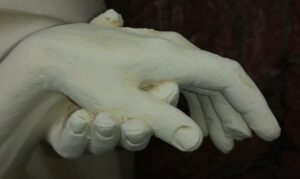The Heroism of Carrying Emotional Burdens

I am the only person among my friends who didn’t watch Downton Abbey when it was originally being broadcast. But recently, after a great deal of prodding from my wife, I started watching the Masterpiece Classic series. At quite a few junctures I saw the stiff-upper-lip attitude that I associate with the British mentality—at least the height of that mentality—in the early 20th century.
I had never thought too much about the purpose of maintaining a stiff upper lip. I suppose, if I had been asked, I would have said that it was about protecting oneself from being seen as weak, or the fear of being overwhelmed by emotions. I have certainly seen that attitude in some of the dying people I served or in their loved ones—most of whom were not British. I guess that attitude is common enough among segments of a number of cultures.
But, I now see that approach to death and dying from a somewhat different perspective, because of a movie I saw just a couple of months ago: The Farewell. It is the story of a Chinese grandmother who is dying from cancer, but the family chooses not to tell her. In fact, they lie and tell her that she has been cured. They all gather in China to throw a wedding party, which is secretly their goodbye party for her. I have also seen this approach in a few families, where they try desperately to shield the dying person from knowing they are dying.
I struggled through most of the movie because it is so contrary to my own moral code that says it is the right of every person to know they are dying. That knowledge gives them the opportunity to live their last days in harmony with their deepest wishes.
Almost at the end of the movie one of the grandmother’s sons gives his Americanized daughter an explanation for why the family did what they did, which was a revelation for me. He said that by maintaining the secret they were carrying the burden of the feelings for the grandmother. They were accepting the emotional pain to free her from having to experience it. Suddenly, what I thought was cruel and immoral became almost heroic.
That brings me back to Downton Abbey. As I watched I wondered if the stiff-upper-lip approach was just another form of heroism. For the dying and their loved ones, it isn’t hiding the truth, but it’s a way to not add extra fuel to the fire of emotions. The dying and their loved ones suffer alone so they don’t add more suffering to the other.
I have reflected on these two different approaches to “carrying the burden for the other.” And it has led me to see my own approach in a more nuanced way. Instead of just feeling the moral rightness of allowing people to face their dying openly and consciously, I now see the heroism of that approach.
Whether it is the dying person, a loved one, or me as a doula, openly facing death together is openly living the burden together. It is the heroism of accepting pain for each other and ourselves at the same time. Not turning away from it, not hiding it, but rather embracing it for the sake of each other. That is an amazing—and at times transformative—gift.
I want to be clear: we as doulas have to support people no matter which form of burden they choose to live and die with. Our role is to always be present without judgment. But in a person’s heart, they can still choose how they wish to experience, carry, and understand the emotional burden of facing death. It is all heroic.
